| Listing 1 - 10 of 30 | << page >> |
Sort by
|
Book
ISBN: 9782841372331 2841372332 Year: 2008 Publisher: Grenoble Millon
Abstract | Keywords | Export | Availability | Bookmark
 Loading...
Loading...Choose an application
- Reference Manager
- EndNote
- RefWorks (Direct export to RefWorks)
Literature --- Books and reading --- Reading --- Reader-response criticism --- Livres et lecture --- Lecture --- Esthétique de la réception --- Psychological aspects --- Philosophy --- History --- Aspect psychologique --- Philosophie --- Histoire --- Esthétique de la réception --- Psychological aspects. --- Philosophy. --- History.
Multi
ISBN: 9780521190312 0521190312 9780511760877 110846680X 1107213614 0511861907 9786612921698 0511859589 0511860455 051185871X 0511856970 0511760876 128292169X 0511857845 9780511860454 9780511857843 Year: 2010 Publisher: Cambridge Cambridge university press
Abstract | Keywords | Export | Availability | Bookmark
 Loading...
Loading...Choose an application
- Reference Manager
- EndNote
- RefWorks (Direct export to RefWorks)
"Augustine's philosophy of life involves reviewing one's past and exercises for self-improvement. Centuries after Plato and before Freud he invented a 'spiritual exercise' in which every man and woman is able, through memory, to reconstruct and reinterpret life's aims. Brian Stock examines Augustine's unique way of blending literary and philosophical themes. He proposes a new interpretation of Augustine's early writings, establishing how the philosophical soliloquy (soliloquium) has emerged as a mode of inquiry and how it relates to problems of self-existence and self-history. The book also provides clear analysis of inner dialogue and discourse and how, as inner dialogue complements and finally replaces outer dialogue, a style of thinking emerges, arising from ancient sources and a religious attitude indebted to Judeo-Christian tradition"--
Augustine of Hippo --- Soliloquy --- Monologue --- Self --- Spiritual exercises --- Augustine, --- Moi (Psychologie) --- Exercices spirituels --- Soliloque --- Monologue intérieur (littérature) --- Soi --- Augustin --- Exercises, Spiritual --- Meditations --- Drama --- Personal identity --- Consciousness --- Individuality --- Mind and body --- Personality --- Thought and thinking --- Will --- Monopolylogue --- Dialogue --- Avgustin, Blazhennyĭ, --- Augustinus, Aurelius, --- Augustyn, --- Augustin, --- Ughasṭīnūs, --- Agostino, --- Agustí, --- Augoustinos, --- Aurelius Augustinus, --- Augustinus, --- Agustín, --- Aurelio Agostino, --- Episkopos Ippōnos Augoustinos, --- Augoustinos Ipponos, --- Agostinho, --- Aurelli Augustini, --- Augustini, Aurelli, --- Aurelii Augustini, --- Augustini, Aurelii, --- Ōgostinos, --- Agostino, Aurelio, --- אוגוסטינוס הקדוש --- أغسطينوس، --- 奥古斯丁 --- Soi. --- Exercices spirituels. --- Avgustin, --- Augustinus, Aurelius --- Agostinho --- Augustine d'Hippone --- Agostino d'Ippona --- Augustin d'Hippone --- Augustinus Hipponensis, sanctus --- Sant'Agostino --- Augustinus van Hippo --- Aurelius Augustinus --- Aurelio Agostino --- 聖アウグスティヌス --- アウグスティヌス --- Augustine --- Augustine, - Saint, Bishop of Hippo --- Arts and Humanities --- History --- Soliloquy. --- Monologue. --- Self. --- Spiritual exercises. --- Monologue intérieur (littérature)
Book
ISBN: 2841371697 9782841371693 Year: 2005 Volume: *1 Publisher: Grenoble Millon
Abstract | Keywords | Export | Availability | Bookmark
 Loading...
Loading...Choose an application
- Reference Manager
- EndNote
- RefWorks (Direct export to RefWorks)
Filosofie en literatuur --- Philosophie et littérature --- Philosophy and litterature --- Philosophy, Medieval. --- Philosophie médiévale --- Philosophy, Medieval --- Mediaeval philosophy and ethics --- Reading --- Studies --- Philosophie médiévale --- Psychological aspects --- Self-knowledge --- Middle Ages --- Books and reading --- Medieval philosophy --- Scholasticism --- Acqui 2006
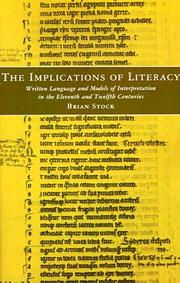
ISBN: 0691053685 0691102279 9780691053684 9780691102276 Year: 1983 Publisher: Princeton, N.J. : Princeton University Press,
Abstract | Keywords | Export | Availability | Bookmark
 Loading...
Loading...Choose an application
- Reference Manager
- EndNote
- RefWorks (Direct export to RefWorks)
Written communication --- Learning and scholarship --- History --- -Learning and scholarship --- -Erudition --- Scholarship --- Civilization --- Intellectual life --- Education --- Learned institutions and societies --- Research --- Scholars --- Written discourse --- Written language --- Communication --- Discourse analysis --- Language and languages --- Visual communication --- History. --- -History --- -Written communication --- -Civilization --- Erudition --- Medieval learning and scholarship --- Education, Medieval --- Written communication - Europe - History --- Learning and scholarship - History - Medieval, 500-1500
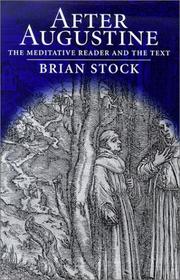
ISBN: 0812236025 1322511128 0812203046 Year: 2001 Publisher: Philadelphia (Pa.): University of Pennsylvania Press
Abstract | Keywords | Export | Availability | Bookmark
 Loading...
Loading...Choose an application
- Reference Manager
- EndNote
- RefWorks (Direct export to RefWorks)
Augustine of Hippo was the most prolific and influential writer on reading between antiquity and the Renaissance, though he left no systematic treatise on the subject. His reluctance to synthesize his views on other important themes such as the sacraments suggests that he would have been skeptical of any attempt to bring his statements on reading into a formal theory. Yet Augustine has remained the point of reference to which all later writers invariably return in their search for the roots of problems concerning reading and interpretation in the West.Using Augustine as the touchstone, Brian Stock considers the evolution of the meditative reader within Western reading practices from classical times to the Renaissance. He looks to the problem of self-knowledge in the reading culture of late antiquity; engages the related question of ethical values and literary experience in the same period; and reconsiders Erich Auerbach's interpretation of ancient literary realism.In subsequent chapters, Stock moves forward to the Middle Ages to explore the attitude of medieval Latin authors toward the genre of autobiography as a model for self-representation and takes up the problem of reading, writing, and the self in Petrarch. He compares the role of the reader in Augustine's City of God and Thomas More's Utopia, and, in a final important move, reframes the problem of European cultural identity by shifting attention from the continuity and change in spoken language to significant shifts in the practice of spiritual, silent reading in the Middle Ages and Renaissance. A richly rewarding reflection on the history and nature of reading, After Augustine promises to be a centerpiece of discussions about the discovery of the self through literature.
#GOSA:II.P.AU.2.M --- Books and reading --- Self-knowledge, Theory of --- Introspection (Theory of knowledge) --- Knowledge, Reflexive --- Knowledge of self, Theory of --- Reflection (Theory of knowledge) --- Reflexive knowledge --- Knowledge, Theory of --- Personality (Theory of knowledge) --- Self (Philosophy) --- History --- Augustine, --- Avgustin, Blazhennyĭ, --- Augustinus, Aurelius, --- Augustyn, --- Augustin, --- Ughasṭīnūs, --- Agostino, --- Agustí, --- Augoustinos, --- Aurelius Augustinus, --- Augustinus, --- Agustín, --- Aurelio Agostino, --- Episkopos Ippōnos Augoustinos, --- Augoustinos Ipponos, --- Agostinho, --- Aurelli Augustini, --- Augustini, Aurelli, --- Aurelii Augustini, --- Augustini, Aurelii, --- Ōgostinos, --- Agostino, Aurelio, --- אוגוסטינוס הקדוש --- أغسطينوس، --- 奥古斯丁 --- Books and reading. --- Influence. --- History. --- Avgustin, --- Augustinus, Aurelius --- Agostinho --- Augustine of Hippo --- Augustine d'Hippone --- Agostino d'Ippona --- Augustin d'Hippone --- Augustinus Hipponensis, sanctus --- Sant'Agostino --- Augustinus van Hippo --- Aurelius Augustinus --- Aurelio Agostino --- 聖アウグスティヌス --- アウグスティヌス --- Augustine --- Ancient Studies. --- Cultural Studies. --- Literature. --- Medieval and Renaissance Studies.
Book
ISBN: 0691052018 0691619476 1400872367 9780691052014 Year: 1972 Publisher: Princeton, N.J. University Press
Abstract | Keywords | Export | Availability | Bookmark
 Loading...
Loading...Choose an application
- Reference Manager
- EndNote
- RefWorks (Direct export to RefWorks)
The Cosmographia of Bernard Silvester was the most important literary myth written between Lucretius and Dante. One of the most widely read books of its time, it was known to authors whose interests were as diverse as those of Vincent of Beauvais, Dante, and Chaucer. Bernard offers one of the most profound versions of a familiar theme in medieval literature, that of man as a microcosm of the universe, with nature as the mediating element between God and the world. Brian Stock's exposition includes many passages from the Cosmographia translated for the first time into English. Arising from the central analysis are several more general themes: among them the recreation by twelfth-century humanists of the languages of myth and science as handed down in the classical tradition; the creation of the world and of man, the chief mythical and cosmographical problem of the period; the development of naturalistic allegory; and Bernard's relation to the "new science" introduced from Greek and Arabic sources.Originally published in 1972.The Princeton Legacy Library uses the latest print-on-demand technology to again make available previously out-of-print books from the distinguished backlist of Princeton University Press. These editions preserve the original texts of these important books while presenting them in durable paperback and hardcover editions. The goal of the Princeton Legacy Library is to vastly increase access to the rich scholarly heritage found in the thousands of books published by Princeton University Press since its founding in 1905.
Bernardus Silvestris --- Bernard Silvestris, --- Classical Latin literature --- Philosophy, Medieval --- Science, Medieval --- Philosophy, Medieval. --- Science, Medieval. --- Medieval philosophy --- Scholasticism --- Medieval science --- Bernard Silvestris, - active 1136
Book
ISBN: 0691093962 0691000263 0691655685 0691196583 9780691093963 Year: 1983 Publisher: Princeton, N.J.
Abstract | Keywords | Export | Availability | Bookmark
 Loading...
Loading...Choose an application
- Reference Manager
- EndNote
- RefWorks (Direct export to RefWorks)
This volume brings together studies by a distinguished classical scholar that address specific problems associated with the development of literacy in ancient Greece. The articles were written over a twenty-year period and published individually in various journals and books. They deal with Greece's technological and intellectual transition from a preliterate to a literate culture, showing the effects registered by the introduction of the alphabet as the written word came to replace its oral counterpart in the literature of Greece and of Eur pe.Eric A. Havelock is Sterling Professor Emeritus of Classics at Yale University. His numerous publications include The Liberal Temper in Greek Politics (Yale), Preface to Plato (Harvard), and The Greek Concept of Justice (Harvard).Originally published in 1982.The Princeton Legacy Library uses the latest print-on-demand technology to again make available previously out-of-print books from the distinguished backlist of Princeton University Press. These editions preserve the original texts of these important books while presenting them in durable paperback and hardcover editions. The goal of the Princeton Legacy Library is to vastly increase access to the rich scholarly heritage found in the thousands of books published by Princeton University Press since its founding in 1905.
History of education and educational sciences --- Christian church history --- Didactics of languages --- anno 800-1199 --- Formulaic analysis, Oral --- Oral-formulaic analysis. --- Greek language --- Greek literature --- Oral-formulaic analysis --- Oral tradition --- 02 <09> <38> --- 091 =75 --- 091 --- 930.85:02 --- Folk literature --- Folklore --- Tradition, Oral --- Oral communication --- Oral history --- 091 Handschriftenkunde. Handschriftencatalogi --- Handschriftenkunde. Handschriftencatalogi --- 930.85:02 Cultuurgeschiedenis. Kultuurgeschiedenis-:-Bibliotheekwezen --- Cultuurgeschiedenis. Kultuurgeschiedenis-:-Bibliotheekwezen --- 091 =75 Handschriftenkunde. Handschriftencatalogi--Grieks --- Handschriftenkunde. Handschriftencatalogi--Grieks --- 02 <09> <38> Bibliotheekwezen:--algemene geschiedenis--Oud-Griekenland --- Bibliotheekwezen:--algemene geschiedenis--Oud-Griekenland --- Alphabet --- History and criticism --- Methodology --- Oral tradition. --- Alphabet. --- History and criticism. --- Greek language - Alphabet --- Greek literature - History and criticism
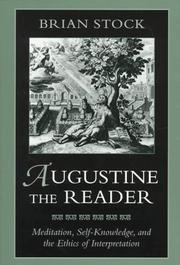
ISBN: 0674044045 9780674044043 9780674052772 0674052765 9780674052765 0674052773 9780674052772 Year: 1996 Publisher: Cambridge (Mass.): Belknap press of Harvard university press
Abstract | Keywords | Export | Availability | Bookmark
 Loading...
Loading...Choose an application
- Reference Manager
- EndNote
- RefWorks (Direct export to RefWorks)
Stock displays an enviable and intimate knowledge of the text of Augustine, above all of his Confessions and, as the book progresses, of the De Trinitate.
Books and reading. --- Spirituality --- Appraisal of books --- Books --- Choice of books --- Evaluation of literature --- Literature --- Reading, Choice of --- Reading and books --- Reading habits --- Reading public --- Reading --- Reading interests --- Reading promotion --- History. --- Appraisal --- Evaluation --- Augustine, --- Avgustin, --- Augustinus, Aurelius, --- Augustyn, --- Augustin, --- Ughasṭīnūs, --- Agostino, --- Agustí, --- Augoustinos, --- Aurelius Augustinus, --- Augustinus, --- Agustín, --- Aurelio Agostino, --- Episkopos Ippōnos Augoustinos, --- Augoustinos Ipponos, --- Agostinho, --- Ōgostinos, --- Agostino, Aurelio, --- אוגוסטינוס הקדוש --- أغسطينوس، --- 奥古斯丁 --- Knowledge and learning. --- Influence. --- Books and reading --- -Spiritual-mindedness --- Philosophy --- Religion --- Spiritual life --- History --- Augustine Saint, Bishop of Hippo --- -Augustine Saint, Bishop of Hippo --- -Books and reading --- Influence --- Knowledge and learning --- Self-knowledge, Theory of --- #GOSA:II.P.AU.3 --- Introspection (Theory of knowledge) --- Knowledge, Reflexive --- Knowledge of self, Theory of --- Reflection (Theory of knowledge) --- Reflexive knowledge --- Knowledge, Theory of --- Personality (Theory of knowledge) --- Self (Philosophy) --- -Appraisal of books --- Spiritual-mindedness --- Augustinus, Aurelius --- Agostinho --- Augustine of Hippo --- Augustine d'Hippone --- Agostino d'Ippona --- Augustin d'Hippone --- Augustinus Hipponensis, sanctus --- Sant'Agostino --- Augustinus van Hippo --- Aurelius Augustinus --- Aurelio Agostino --- 聖アウグスティヌス --- アウグスティヌス --- Livres et lecture --- Spiritualité --- Histoire --- Augustine --- -History
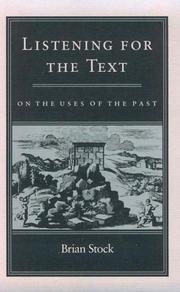
ISBN: 0812216121 Year: 1997 Publisher: Philadelphia (Pa.) : University of Pennsylvania,
Abstract | Keywords | Export | Availability | Bookmark
 Loading...
Loading...Choose an application
- Reference Manager
- EndNote
- RefWorks (Direct export to RefWorks)
Hermeneutics. --- Historiography. --- Semiotics.
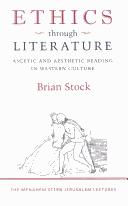
ISBN: 9781584656999 1584656999 Year: 2007 Publisher: Hanover : University Press of New England,
Abstract | Keywords | Export | Availability | Bookmark
 Loading...
Loading...Choose an application
- Reference Manager
- EndNote
- RefWorks (Direct export to RefWorks)
| Listing 1 - 10 of 30 | << page >> |
Sort by
|

 Search
Search Feedback
Feedback About UniCat
About UniCat  Help
Help News
News